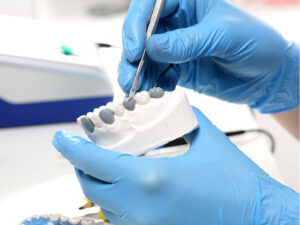Renew, Restore your natural teeth
Root canal treatment is a valuable dental procedure for saving teeth that would otherwise require extraction due to infection or damage to the pulp.
What is a Root Canal
A root canal is a dental procedure aimed at treating infection or damage within the pulp of a tooth. The pulp, found in the center of the tooth, consists of nerves, blood vessels, and connective tissue. When the pulp becomes infected or inflamed, it can cause severe pain and potentially lead to abscess formation if left untreated.
Causes of Root Canal Problems:
Trauma: Physical injury to the tooth can damage the pulp, leading to inflammation or infection.
Cracked or fractured tooth: A crack or fracture in the tooth can provide a pathway for bacteria to enter the pulp.
Repeated dental procedures: Multiple dental procedures on the same tooth can increase the risk of pulp inflammation or infection.
Consultation:
If you experience persistent tooth pain, sensitivity to hot or cold, swelling, or discoloration of the tooth, it’s essential to consult a dentist. During the consultation, the dentist will conduct a thorough examination, which may include X-rays, to assess the extent of the damage and determine if a root canal is necessary.
A root canal is a dental procedure aimed at treating infection or damage within the pulp of a tooth. The pulp, found in the center of the tooth, consists of nerves, blood vessels, and connective tissue. When the pulp becomes infected or inflamed, it can cause severe pain and potentially lead to abscess formation if left untreated.
Available Treatments:
Root canal treatment involves several steps:
- Local anesthesia is administered to numb the tooth and surrounding area.
- The dentist creates an opening in the crown of the tooth to access the pulp chamber.
- The infected or inflamed pulp is removed, and the root canals are cleaned, shaped, and disinfected.
- The root canals are filled with a biocompatible material called gutta-percha to seal them and prevent reinfection.
- A temporary or permanent filling is placed to seal the access opening in the tooth.
- In some cases, a dental crown may be recommended to protect the tooth and restore its strength and functionality.
Aftercare:
After a root canal procedure, it’s essential to follow your dentist’s instructions for aftercare, which may include:
- Avoiding chewing on the treated tooth until it’s fully restored.
- Taking prescribed medications, such as antibiotics or pain relievers.
- Maintaining good oral hygiene by brushing and flossing regularly.
- Attending follow-up appointments with your dentist to monitor the healing process.
Advantages of Root Canal Treatment:
- Relieves pain: Root canal treatment alleviates toothache caused by pulp inflammation or infection.
- Saves the tooth: Rather than extracting the tooth, root canal treatment preserves the natural tooth structure.
- Restores function: After root canal treatment, the tooth can continue to function normally for biting and chewing.
Disadvantages of Root Canal Treatment:
In some cases, complications such as incomplete removal of infected tissue or reinfection may occur, necessitating additional treatment.
Photos:
Root Canal FAQ
With modern techniques and anesthesia, root canal treatment is typically no more painful than getting a dental filling.
The duration of a root canal procedure varies depending on factors such as the tooth’s location, number of canals, and extent of infection. On average, it may take one to two hours.
Root canal treatment can be a long-lasting solution, but the success of the procedure depends on factors such as proper sealing of the root canals and maintaining good oral hygiene.
Conclusion:
Root canal treatment is a valuable dental procedure for saving teeth that would otherwise require extraction due to infection or damage to the pulp. With advancements in dental technology and techniques, root canal procedures have become more comfortable and effective, offering patients relief from pain and preserving their natural smiles. If you’re experiencing tooth pain or other symptoms of pulp infection, don’t hesitate to consult a dentist to discuss whether root canal treatment is right for you.
Services
Specialists







